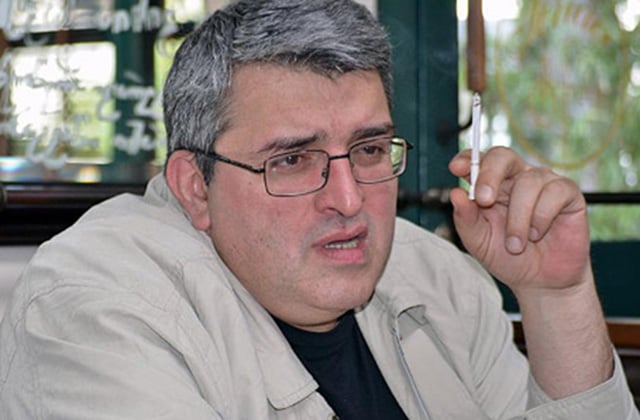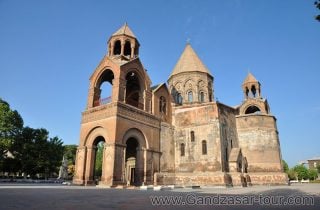It’s Important for Putin’s Global Purposes, that Armenia’s Authorities were more Concessive: Gela Vasadze

Interview with Gela Vasadze, editor-in-chief of Black Sea Press, political scientist.
Mr. Vasadze, the forthcoming Parliamentary elections are being widely discussed in international press. These days Georgian PM Georgi Kvirikashvili stated that “Georgian dream” will win in the forthcoming elections. How is Georgia preparing for the elections? Which moods are available in your country?
Currently only political parties are actively preparing for the elections. Georgia. To say that electoral campaign has been already launched, will be improper, as especially now is a vacation period, people are relaxing in the sea, in the mountains. As for the possibilities of political powers, I have long ago taken into consideration that anticipating election results two months before, they’ll be held on October 8, is a thankless and difficult job, as it’s not easy to anticipate how the events will develop first and foremost inside Georgia and in the external life in this period.
It’s another issue, that according to the quests of Georgian National Sociological Institute, “Georgian dream” has some privilege, oppositional “National movement” is on the second place. According to those quests two more political parties, which will appear in the Parliament are “State for nation,” belonging to well-known Georgian opera singer, benefactor and social figure Paata Burchuladze and pro-Russian “Alliance of patriots.”
Contestation will be launched between these four political powers. By the way, supporters of “Georgia dream” and “National movement” don’t so differ in number, moreover, these two political parties have considerable privilege over the other two. Another political party, which has realistic chances is “Free democrats,” belonging to former Defense Minister Irakli Alasania. Possibilities of other parties to appear in the Parliament are less.
According to some experts, it’s not excluded that a new situation will be established in the region through the forthcoming elections in Georgia, as Russia will follow preparations with great attention, moreover, according to those opinions Russia has concerns that “Georgian dream” won’t win in the elections, which pushes it to strengthen its positions in Armenia and the South Caucasus, by which its recent decision and activities regarding Armenia and NK conflict have been conditioned. In your opinion, how will Russia reflect to the elections in case of different scenarios of its exit?
Russia not only follows, but greatly impacts the moods and political life inside the country, through its controlled press, agencies. Naturally, Russia will greatly influence, maintenance of the status quo in Georgia is of utmost importance for Russia, which supposes victory of “Georgian dream.” Despite the fact, that it’s considered a pro-West power, there are figures among the party, who are really pro-West, but the important and decisive point here is that the party belongs to a Russian oligarch. They realize in the Kremlin that today it’s impossible to reach more in Georgia. Frankly speaking, anticipation of the victory of a pro-Russian party will be simplicity, as it’s impossible, they will succeed to get 15%.
What may be anticipated from the Kremlin prior to the elections? How will it function?
Everything will depend on the situation in the country. If the situation is such, that possibilities of “Georgian dream” reduce, various provocations are possible, including war.
As for recent steps by Russia towards Armenia, I don’t think that they have connection with Georgia. Here Russia’s relations with Turkey an Azerbaijan will be sought. Although, naturally, in this snapshot Georgia also has its role, however, obviously, it’s not the main point. It’s not because of Georgia that today Russia intends to totally subdue Armenia’s ruling elite. Other reasons are available here as well.
Which reasons do you mean?
Today it’s of utmost importance for Putin to record foreign policy victories. Such a victory may become Azerbaijan’s membership to the Eurasian Economic Union (EEU), as well as deploying Russian peacekeeping mission in Karabakh. Russia faces two global issues in the South Caucasus. For this, naturally, concessions are necessary; from Azerbaijan’s perspective it’s useless joining integration structures initiated by Russia. Thus, it’s crucial for Putin that Armenia’s authorities were more concessive, than they’re now.
Possibilities of which counter steps do you observe for the Armenian side?
The most important, which I’d advise to Armenia’s authorities, is more listen to the claims of the Armenian society, i.e. to totally act by the will of the society, the people, solving all the issues, to which the society opposes. If they succeed to settle these issues in the internal life, then Armenia’s authorities will be stable and strong regarding their foreign policy. Authorities, which don’t have social support have rather instable positions in foreign policy. This is a formula for all countries.
As you know, a two-week crisis was recorded as a result of seizure of the police precinct. The armed group has surrendered. What conclusions should Armenia’s authorities draw, what do you think?
It’s clear that a seizure has been recorded by a group of armed people, however, the authorities should think over a simple issue: why did the society appear in the street in support of that group? They did it not to support the armed people, i.e. they didn’t went out for an exact person, but for the reason that the authorities don’t hear their voices, don’t take them into consideration, there is no communication between the authorities and the society.
If the authorities don’t restore that communication, it will be developed by the authorities following them. I’m almost convinced, when Russia oppresses Armenia’s authorities regarding withdrawal of territories, that time Serzh Sargsyan will make reference to the tense situation in the country, that he doesn’t control the situation, thus, he can’t withdraw territories. Upon this principle social demand should be reflected in foreign policy.
By Araks Martirosyan

























